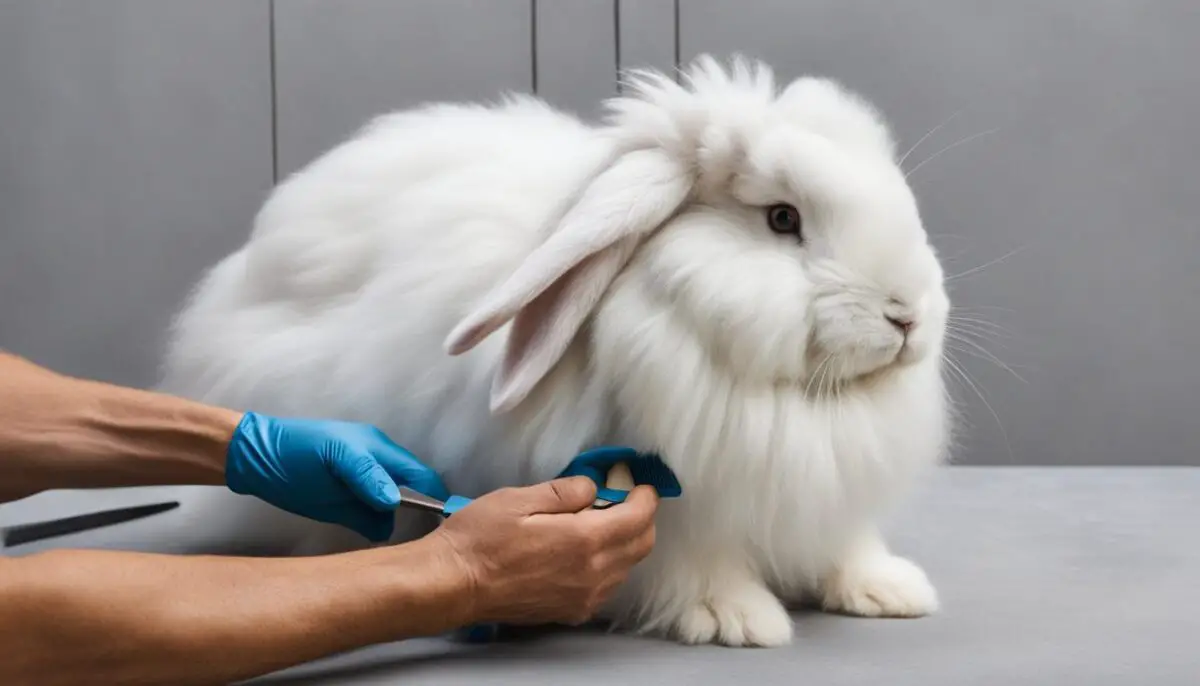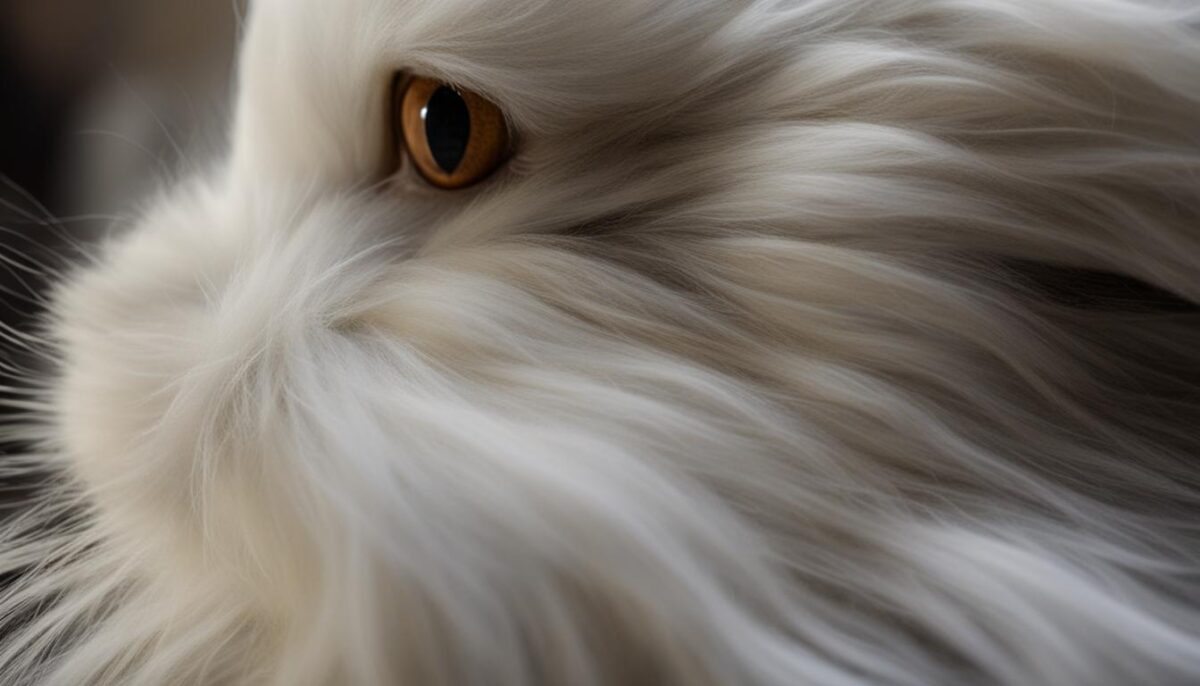French Angora rabbits are an exquisite breed known for their luxurious wool. Originating in Turkey in the 1700s, they arrived in the United States in the 1840s and have since gained popularity among rabbit enthusiasts. Being one of the oldest domesticated breeds, they bring a rich heritage to any rabbitry.
French Angora rabbits are just one of the four recognized Angora rabbit breeds. Alongside their English, Satin, and Giant counterparts, French Angoras showcase their unique characteristics and make a delightful addition to any rabbit-loving family.
If you’re considering raising Angora rabbits, it’s essential to know how to care for these fluffy creatures properly. From housing and grooming to feeding and health, let’s explore the ins and outs of raising French Angoras.
Key Takeaways:
- French Angora rabbits have a rich heritage and are one of the oldest domesticated breeds.
- They are known for their luxurious wool and belong to the family of Angora rabbit breeds.
- Proper care includes attention to housing, grooming, feeding, and monitoring their health.
- Raising Angora rabbits can be a rewarding experience for individuals and families alike.
- Understanding the unique needs of French Angora rabbits helps ensure their well-being and the quality of their wool.
Outdoor Hutch for French Angora Rabbits
When building or choosing an outdoor hutch for your French Angora rabbit, it’s important to consider their specific needs. Here are a few key factors to consider:
- Size: The hutch should be spacious enough to allow the rabbit to move comfortably, stretch, and hop around. A minimum size of 6 feet long, 3 feet wide, and 3 feet high is recommended.
- Security: The hutch should have a solid and predator-proof design, with secure latches and proper wiring to prevent any unwanted access.
- Shelter: The hutch should provide a sheltered area that offers protection from direct sunlight, rain, wind, and other harsh weather conditions.
- Flooring: Use a solid or wire mesh flooring that allows for easy cleaning and proper drainage of urine and waste.
- Bedding: Provide appropriate bedding materials, such as hay or straw, for insulation and comfort.
- Access: Ensure easy access to the hutch for cleaning, feeding, and interaction with the rabbit.
By considering these factors and providing a suitable outdoor hutch, you can create a safe and comfortable living space for your French Angora rabbit to enjoy the outdoors while ensuring their well-being.
Grooming and Wool Care
Grooming is an essential part of caring for French Angora rabbits. Their long fur requires regular maintenance to prevent matting and wool block. By following proper grooming techniques, you can ensure the health and well-being of your rabbit, as well as maintain the quality of their luxurious angora wool.
When it comes to grooming equipment, commonly used dog grooming tools are recommended for French Angora rabbits. These include:
- Steel-toothed comb: Ideal for gently detangling the fur and removing any mats or tangles.
- Bulb-tipped brush: Helps to groom the wooly coat without causing discomfort to the rabbit’s sensitive skin.
- Slicker brush: Useful for removing loose hair and preventing matting.
- Scissors: Used to trim any excessively long or tangled fur.
During grooming sessions, it’s important to comb and brush through the entire coat of your French Angora rabbit. Pay close attention to areas that are prone to matting, such as the chest, behind the ears, and under the hindquarters. Regular grooming not only keeps the fur in good condition but also allows you to bond with your rabbit and check for any signs of skin issues or parasites.

Maintaining Angora Wool Quality
In addition to regular grooming, there are a few extra steps you can take to ensure the quality of your French Angora rabbit’s wool:
- Keep the environment clean: A clean and hygienic living space minimizes the risk of the wool getting dirty or contaminated.
- Provide a balanced diet: Proper nutrition is essential for maintaining healthy fur growth. Ensure your rabbit has a diet rich in hay, fresh greens, and fortified pellets.
- Monitor for any signs of wool block: Wool block occurs when rabbits ingest excessive amounts of fur during grooming. Monitor your rabbit’s eating and digestion habits, and seek veterinary attention if you notice any signs of gastrointestinal issues.
By following these grooming and wool care practices, you can keep your French Angora rabbit looking and feeling their best while enjoying the benefits of their beautiful angora wool.
Feeding and Nutrition
Proper nutrition is crucial for maintaining the health of French Angora rabbits. A well-balanced diet ensures that they receive the necessary nutrients to thrive. Here are some key guidelines to follow when feeding your furry friend:
- Hay: The majority of their diet should consist of high-quality hay. It not only aids in promoting normal digestion but also helps prevent the formation of wool block, a common issue in Angora rabbits. Timothy hay or orchard grass hay are excellent choices.
- Greens: In addition to hay, French Angora rabbits should be offered a daily serving of dark leafy greens. These greens provide essential vitamins and minerals. Some recommended options include parsley, kale, and cilantro.
- Pellets: Fortified pellets should also be included in their diet. These pellets provide the necessary nutrients that may not be fully met through hay and greens alone. Look for specially formulated pellets for Angora rabbits.
- Treats: Treats should be given sparingly and should not exceed 10% of their overall diet. It’s important to avoid high-fat or high-sugar treats, as they can contribute to weight gain and other health issues. Opt for small portions of rabbit-friendly treats as an occasional reward.
- Water: Finally, fresh and clean water should be available to your rabbit at all times. Ensure that their water source is regularly replenished and free from contaminants.
Remember, maintaining a consistent and balanced diet is essential for the overall well-being of your French Angora rabbit.
For more information on feeding and nutrition, consult with a veterinarian or a rabbit care specialist.

| Health Issues | Prevention and Management |
|---|---|
| Wool Block |
– Regular grooming to remove loose fur – Providing a balanced diet and proper hydration – Monitoring for signs of gastrointestinal blockage |
| Gastrointestinal Stasis |
– Balanced diet with fiber-rich foods – Regular exercise and mental stimulation – Prompt veterinary care for any signs of digestive issues |
Temperament and Behavior
French Angora rabbits are known for their intelligent and social nature. While they may not demand as much attention as some other rabbit breeds, they thrive on human interaction and play. Their temperament makes them suitable pets for individuals or families with experience in rabbit care.
Regular interactions with their human companions are important for the well-being of French Angora rabbits. Engaging in activities such as gentle petting, grooming sessions, and playtime helps to build a strong bond with them. These activities also provide mental stimulation, preventing boredom and ensuring their overall happiness.
It’s important to understand the temperament and behavior of French Angora rabbits to create a positive and harmonious relationship. They enjoy a calm environment and may become stressed or anxious in loud or chaotic surroundings. Providing a quiet and peaceful living space will make them feel secure and content.
“French Angora rabbits are intelligent and curious creatures. They enjoy exploring their surroundings and engaging in interactive play. Providing them with toys and safe, chewable objects can keep them entertained and mentally stimulated.” – Sarah Johnson, Rabbit Care Expert
Angora Rabbit Temperament
French Angora rabbits are typically gentle and docile, making them well-suited for families with children. However, it is essential to teach children how to interact with rabbits properly to avoid startling or accidentally injuring them. Supervision is necessary when children are handling these delicate animals to ensure their safety and well-being.
It’s worth noting that each rabbit has its own unique temperament, and some may be more outgoing and sociable than others. It’s important to spend time observing and understanding their individual personalities to tailor your interactions accordingly.
Social Animals
French Angora rabbits are naturally social animals, and interaction with other rabbits can be beneficial for their well-being. However, it’s crucial to introduce rabbits to each other gradually and under supervision to prevent any aggression or territorial behavior. Neutering or spaying rabbits can also help in reducing aggressive tendencies and promoting healthy socialization.
Interacting with humans and other animals of appropriate size and temperament can help French Angora rabbits develop good social skills. It’s important to provide them with a safe and enriching environment that stimulates their natural instincts and encourages positive interactions.
The gentle and social nature of French Angora rabbits makes them delightful companions for those who appreciate their unique qualities. Understanding their temperament and providing regular interactions are key to fostering a positive relationship with these charming furry friends.
Conclusion
In conclusion, caring for French Angora rabbits requires specialized attention and understanding of their unique fur. Creating a suitable living environment, regular grooming, proper feeding, and vigilant health monitoring are crucial aspects of their care. Owners should also prioritize regular interaction and mental stimulation to ensure the overall well-being of these delightful rabbits.
By following these care tips and investing the time and effort in understanding the breed, owners can establish a rewarding bond with their French Angora rabbits. Additionally, maintaining their luxurious wool becomes an achievable task with consistent care. With dedication and commitment, these adorable rabbits will provide endless joy and companionship while showcasing their impressive wool.
Whether you are a seasoned rabbit owner or new to the world of rabbit care, French Angora rabbits offer a unique and fulfilling experience. Their distinctive needs and charming personalities make them a wonderful addition to any family. Remember, with the right care and attention, you can enjoy the delights of French Angora rabbits while ensuring the health and happiness of these beautiful creatures.
FAQ
Are French Angora rabbits a French breed?
Yes, French Angora rabbits are one of the oldest domesticated breeds, originating in Turkey in the 1700s.
How much wool do French Angora rabbits produce per year?
French Angora rabbits can produce up to 4 pounds of wool per year.
Can French Angora rabbits be housed outside?
Yes, French Angora rabbits can be housed inside or outside, but it is essential to provide a secure outdoor hutch to protect them from predators.
What is the recommended temperature range for French Angora rabbits?
French Angora rabbits tolerate temperatures from 50-75 degrees F but should be kept in the shade to avoid overheating.
How should French Angora rabbits be groomed?
French Angora rabbits require regular grooming with dog grooming equipment such as a steel-toothed comb, bulb-tipped brush, slicker brush, and scissors. Grooming sessions should include combing and brushing through the entire coat to prevent matting.
What should French Angora rabbits be fed?
French Angora rabbits require a balanced diet consisting mainly of hay, supplemented with dark leafy greens and fortified pellets. High-fat or high-sugar treats should be avoided, and fresh water should be provided at all times.
What are some common health issues in French Angora rabbits?
French Angora rabbits are prone to wool block, caused by hair ingestion, and gastrointestinal stasis, which is a potentially life-threatening condition characterized by slowed or stopped digestion.
Are French Angora rabbits social animals?
Yes, French Angora rabbits are intelligent and social animals. While they may not require as much attention as other rabbits, they thrive on human interaction and play.
How should I interact with my French Angora rabbit?
Regular interactions and providing mental stimulation are important for the well-being of French Angora rabbits. Understanding their temperament and behavior will help create a positive relationship with the rabbit.


